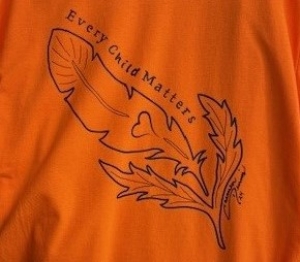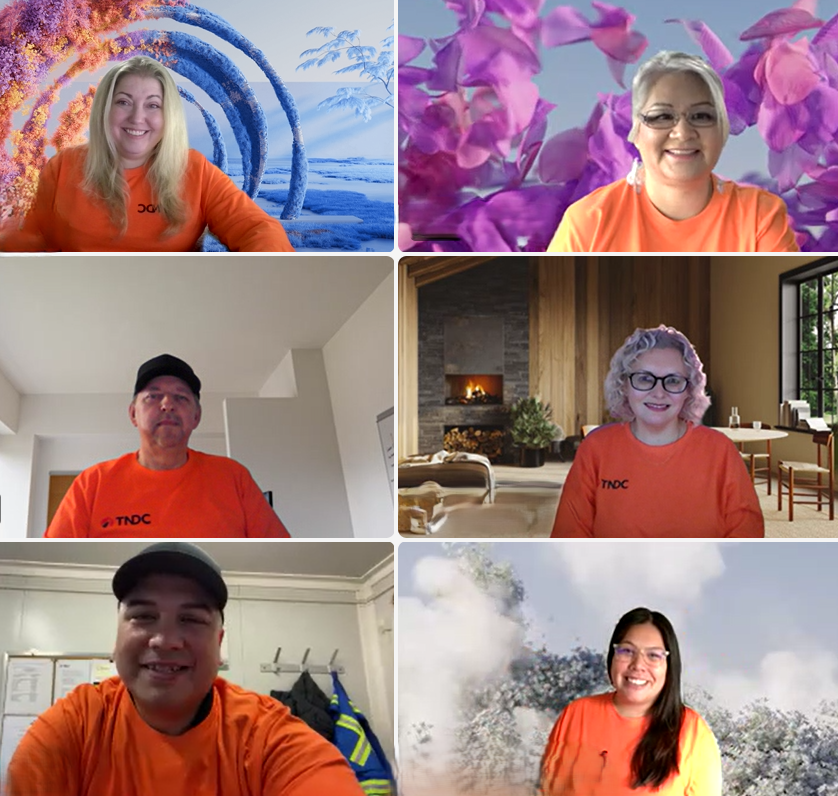TNDC News
2024
26 Sep |
HONOURING LOST INDIGENOUS CHILDREN AND SURVIVORS OF CANADA’S RESIDENTIAL SCHOOLSOn Monday, September 30th, our company will be honouring National Day for Truth and Reconciliation and Orange Shirt Day. This day recognizes the harm inflicted on Canada’s Indigenous people from the horrific legacy of the residential school system. TNDC and the federal government commemorate National Day for Truth and Reconciliation as a statutory holiday. To further recognize this solemn day, we are encouraging our team and those we work with to understand the tragic legacy of Canada’s residential schools and to wear symbolic orange shirts in remembrance of the lost children and survivors. On the shirts for our team this year, we are honoured to feature an Every Child Matters design by Tahltan artist Carmen Dennis. Carmen drew inspiration from Tahltan and Indigenous culture, embracing synergy and sentiment of Every Child Matters.
“I chose an Eagle feather because in many cultures it represents strength, resilience and determination, a heart for those who survived, those who didn’t, and the many generations to come. I also included hodzih łanā (Caribou Leaves) because it is good medicine and is often used for different kinds of healing, it is powerful and good feelings come from it.” Carmen shares. NATIONAL DAY FOR TRUTH AND RECONCILIATIONThe National Day for Truth and Reconciliation (NDTR) was established by the Canadian government in 2021 to honour the children who never returned home from residential schools, and the survivors, as well as their families and communities still affected by the legacy of the residential school system. Public commemoration of this tragic and painful history and ongoing impacts of residential schools is a vital component of the reconciliation process. Establishment of a federal statutory day of commemoration was Call to Action 80 of the Truth and Reconciliation Commission. NDTR builds on the grassroots momentum of Orange Shirt Day. Learn more: National Day for Truth and Reconciliation ORANGE SHIRT DAYOrange Shirt Day originates from the story of Phyllis (Jack) Webstad from the Stswecem’c Xgat’tem First Nation. In 1973, on her first day at St. Joseph’s Residential School in Williams Lake, BC, Phyllis’s shiny new orange shirt was stripped from her, never to be seen again. Forty years later, on September 30, 2013, Phyllis spoke publicly for the first time about her experience, beginning the Orange Shirt Day movement. On September 30th each year, people across Canada wear orange and participate in Orange Shirt Day events to recognize and raise awareness about the history and legacy of the residential school system in Canada. Learn more: Orange Shirt Day RESIDENTIAL SCHOOL HISTORYResidential schools were created and funded by the Canadian government and operated by churches. The goal was to assimilate Indigenous children into society and eliminate their Indigenous knowledge and identity. First Nations, Métis and Inuit children were forcibly removed from their families and communities and put into schools where they were forced to abandon their traditions, cultural practices and languages. They faced horrendous physical, sexual, emotional and psychological abuse at the hands of residential school staff. These schools operated for more than 160 years (1883 to 1996) in all Canadian provinces and territories except Prince Edward Island, New Brunswick and Newfoundland. It is estimated more than 150,000 Indigenous children between the ages of 4 and 16 attended residential schools. Learn more: National Centre for Truth and Reconciliation HEALING AND RECONCILIATIONAs an Indigenous business, owned by the Tahltan Nation, this day holds enriched meaning. The TNDC team stands in solidarity with the many Tahltans and other Indigenous people across Canada who attended these institutions, as well as their families who continue to suffer from this tragic legacy. We offer profound wishes for healing, reconciliation, and a brighter future for Canada’s Indigenous Peoples. EMOTIONAL SUPPORTThis discussion may be difficult for some. Help is available if you need to talk to someone, through the Indian Residential School Survivors Society (24-hour emotional support services): TNDC TEAM ORANGE SHIRT DAY PHOTOS
|



_f540x102_1728610680.jpeg)


